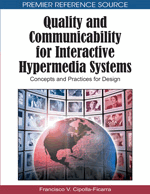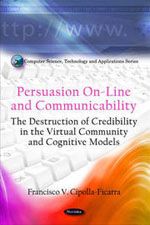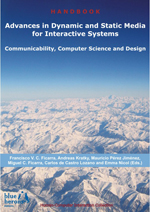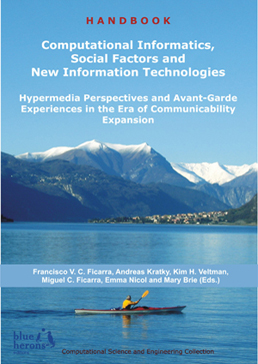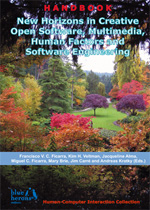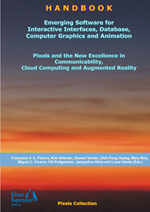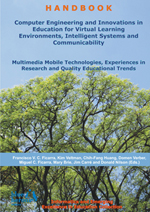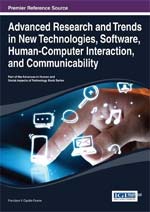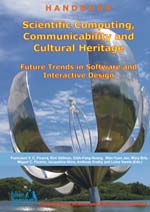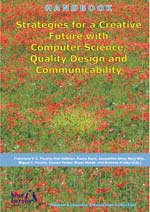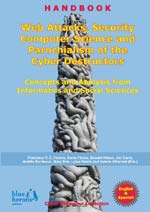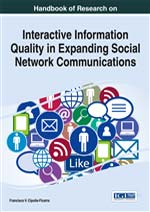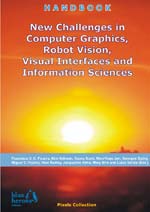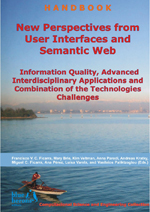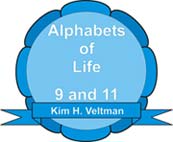Handbook *** Call for Chapter *** Handbook *** Call for Chapter *** Informatics and Emerging Excellence in Education Collection
Title: "Reimaging the Education and Improving the Interactive Systems: New Researches for Mobile Multimedia, Emerging Devices, Design and Communicability"
Handbook Aims
Currently we have the multimedia mobile phone as a device of great dissemination and use among millions of students. However, the pending subject is still the quality in each one of the categories of interactive design. A quality which doesn’t depend on the hardware or the software, but also on the human and social factors. Factors which have an influence on the originality of the content and the creativity in presenting them in the interfaces, whether it is in the online and/or off-line interactive systems.
Originality and creativity are two attributes which will keep being the focus of attention of the users and the motivation of use of the NICTs (new information and communications technology) in the next decades. Consequently, in the modernization of the sciences and the education, as it has been in the 20th century, it is always necessary to start by a panoramic 360 degrees vision of the different disciplines which make up each one of the formal and factual sciences. The goal is to find those positive interactions in the communicability of the students, professors, etc., with the new interactive mobile multimedia devices, for instance.
In the current compendium we intend to gather those works where the authors submit the results, the conclusions and future lines of research in that dynamic process of teaching, inside and outside the classroom. Therefore, the main areas to which this handbook is addressed are: education, pedagogy, hypermedia systems online and off-line, computer science, human factors, interactive design, quality, communicability, and new static or mobile multimedia devices. Although in principle they may denote an expanded list of contents, in fact they connote all those disciplines which in a direct and indirect way might collaborate in reimagining university education through high quality interactive systems as allies to the task of the professor. In other words, a triadic bidirectional relationship between professor, student and new technologies.
In this innovating and renovating action the mercantilist factor has to be excluded from the education to eradicate the negative human or social factors. That is, that we are trying to elaborate a valid and lasting guideline whether it is for the immediate future as well as for the next years. In short, drawing some cardinal axes that should orient the potential designers of the educational and interactive contents resorting to the software and the last generation hardware.
For this reason each of the topics have been broken down further into simpler subsets or keywords, which doesn’t mean that other great challenges for the short, middle and long term future related to the four central axes have been excluded. Besides, an extensive listing connotes and reflects the requirement and also skill necessary to find intersection zones of the disciplines among the different domains, fields, and specialities; which at the same time potentially boosts and merges the formerly different scientific views, and achieves the worthy and rewarding end purpose of improving the quality of life of the current and potential users (i.e., students and teachers) of the interactive systems. Topics of interest (not limited to):
- Adaptive and Intuitive Environments
- Advanced Classroom Technology
- Applications of New Technologies and Communicability for Virtual Education
- Architectures and Algorithms Tackling Technical New Challenges of Educational Mobile Systems
- Assessment of Interactive Systems for Children in Education
- Augmented Cognition and Augmented Reality
- Blended Learning
- Bridging Differences in Culturally Diverse Design Teams for Learning Environments
- Changes and Challenges in Hypermedia Systems for Education
- Cloud Assistance in Educational Contents Distribution
- Cognitive Knowledge Acquisition
- Communicability
- Communicability, Computer Graphics and Interaction
- Communication Technologies and Social Models Used in E-learning
- Computational Linguistics
- Computer Aided Education
- Computer Graphics and Computer Animation for Special Contents
- Computer-Based Learning/Training
- Computer-Supported Collaborative Learning
- Concepts and Practices for International Learning
- Context-aware and Location-based Mobile and Ubiquitous Services
- Creativity and Digital Innovation for Educational Content
- Cross-Cultural Comparisons of Learning Programs
- Cultural and Social Impact of Mobile Multimedia Systems for Education
- Development of Cognitive Systems
- Digital Divide
- Distance Learning and Distance Teaching for Users with Physical Disabilities
- Distributed Computing Support and Middleware for Mobile and Ubiquitous Multimedia
- Dynamics and Statics Media for Education
- E-book
- Educational Experiences for Information and Communications Technologies
- Educational Innovation through Knowledge Transfer
- Educational MashUps
- Educational Models and Anti-Models for Emerging Society
- Educational Models and Anti-Models for PhD and Post-PhD
- E-entertainment
- E-government
- E-learning
- Empathy and Inference Theories for International Users
- E-radio for Learning
- E-tutoring
- Evaluation of New Generation of Computer Games for Education
- Globalization and New Barriers to Learning
- Grids for Learning
- Heuristic Evaluation Methods and Techniques
- Human and Social Factors in Computer Science
- Human-Computer Interaction
- Hyperbase and Compression Methods of the Educational Information
- Hypermedia Mobile Learning Environments and Applications
- Hypertext, Multimedia and Hypermedia Systems
- Immersive Technologies in Advanced Distributed Learning
- Informatics and Pedagogical Models
- Innovative Uses of Technology for Learning and Teaching
- Integration of Virtual Reality and Hypermedia in Educational Contents
- Intelligent Agents and Tutoring Systems
- Intelligent User Interface
- Interactions between Industry/Enterprise and Education
- Knowledge Management and Digital Media
- Languages and Programming Techniques for Artificial Intelligence
- Learning Management Systems
- Local and Global Interactive Design for E-learning
- Localization and Culturally Adaptive Global Interfaces for Education
- Metamorphosis in the Roles of Teachers and Learners in Technology-mediated Environments
- Methods, Techniques and Measures to Assess Learning/Teaching Performance and Experience
- Mobile Advertising, Entertainment and Videogames
- Mobile Augmented Reality Applications for Learning and Teaching
- Multimedia Immersive Networked Environments
- Multimedia Mobile and Ubiquitous Applications and Systems
- New Challenges in Programming Languages and Techniques for Web Classroom
- New Digital Media Used in Preschool
- New Technological Tools and Distributed Data Bases for Education
- New Uses of Emerging and/or Existing Classroom/Users Technologies
- Open-Source E-learning Platforms
- Pedagogical Approaches for Children, Adults and Seniors Students
- Pedagogical Tools for Supporting Learning Environments
- Pedagogy and Computer Engineering Curriculum
- Personal Learning Environments Mobile Learning Environments and Applications
- Pervasive/Ubiquitous Computing
- Quality Metrics for Educational Interactive Systems
- Reusability of the Information for Continuing Education
- Semiotics for Pedagogical Quality
- Social Factors in Videoconferencing Systems
- Social Impact of Emerging Technologies for Educational
- Social Psychology
- Sociology
- Software Architectures for Scientific Computing and Education
- Software Quality
- Strategies for Learning Assessment
- Technologies and Applications Emerging for Microinformatics Systems
- Technology on Assessment Practices in Higher Education
- Technology-Enhanced Learning
- Telecommunications
- Tele-education and Broadcasting Networking Architectures
- Textual Information On-line and Discursive Analysis
- Three-dimensional Reconstruction for Education
- Tools and Development Methods for Building Mobile and Ubiquitous Interactive Systems
- Training and Evaluation Methodologies
- Transfer of Know-How for Technology Used with Children
- TV Interactive
- Usability Engineering
- User-Centered Design
- Using Sensing Technologies for Learning and Teaching
- Video Games for Learning
- Virtual Classroom and Virtual Campus Applications
- Virtual Museums and E-tourism for New Educational Systems
- Virtual Tutors
- Virtual World Creation for Real Simulation, Education and Entertainment
- Web 2.0
- Web 3.0
Submissions:
Two-stage submission: First, interested researchers and practitioners are invited to submit a chapter proposal clearly stating your focused domain problems and contributions related to one of the above topics due on *** Closed ***; second, authors of accepted proposals will be notified by "between two or three week/s after the submission/s" about the status of their proposals and sent chapter organizational guidelines. Full chapters are due by *** Still Open***. All submitted chapters will be reviewed on a triple-blind review basis. The handbook is scheduled to be published in 2016 (Due to multiple request, the editorial advisory board has decided to extend the deadlines) by Blue Herons Editions (Canada, Argentina, Spain and Italy).
Editorial Advisory Board and List of Reviewers
:: Adriana Olleta. Universidad Nacional de Jujuy (Argentina)
:: Alan Radley. University College London (UK)
:: Alejandra Quiroga. Universidad Nacional de La Pampa (Argentina)
:: Andreas Kratky. University of Southern California (USA)
:: Annamaria Poli. Università degli Studi di Milano Bicocca (Italy)
:: David Benjon. Edinburgh Napier University (UK)
:: Daniela Tamburini. Sperimenta Centro Studi Cinema e Formazione di Milano (Italy)
:: Diego González (IMM, National Research Council, Italy)
:: Farshad Fotouhi. Wayne State University (USA)
:: Fiammetta Costa. Polytechnic University of Milan (Italy)
:: Franco Casali. Università di Bologna (Italy)
:: Gavriel Salvendy. Tsinghua University (China)
:: Georges Gyory. University of London (UK)
:: Georgios Styliaras. University of Ioannina (Greece)
:: Héctor Montes. Universidad Nacional de Cuyo (Argentina)
:: José Hamkalo. University of Buenos Aires (Argentina)
:: Juan Silva Salmerón. University of Ottawa (Canada)
:: Jurek Kirakowski. University College Cork (Ireland)
:: Kaoru Sumi. Future University Hakodate (Japan)
:: Karen Woodman. Queensland University of Technology (Australia)
:: Kijpokin Kasemsap. Suan Sunandha Rajabhat University (Thailand)
:: Kim Veltman. Virtual Maastricht McLuhan Institute (The Netherlands)
:: Klementina Možina. University of Ljubljana (Slovenia)
:: Lastenia Bonilla. Universidad de Costa Rica (Costa Rica)
:: Liliana Māţă. "Vasile Alecsandri" University of Bacău (Romania)
:: Ljubica Marjanoviè Umek. University of Ljubljana (Slovenia)
:: Maarten Weyn. Artesis University College Antwerp (Belgium)
:: Marek Wyleżoł. Politechnika Slaska (Poland)
:: María Laura Carranza. Università degli Studi di Molise (Italy)
:: María Teresa Dalmasso. Universidad Nacional de Córdoba (Argentina)
:: Marilú Lebrón Vázquez. Universidad de Puerto Rico (Puerto Rico)
:: Maximiliano Romero. Politecnico (Italy)
:: Miguel Cipolla Ficarra. Alaipo & Ainci (Italy & Spain)
:: Mohamed Hamada. University of Aizu (Japan)
:: Nilda Pérez Otero. Universidad Nacional de Jujuy (Argentina)
:: Onur Demirors. Middle East Technical University (Turkey)
:: Oriol Camacho Díaz. Universidad de Granada (Spain)
:: Özkan Kiliç. Middle East Technical University (Turkey)
:: Peter Stanchev. Kettering University (USA)
:: Philip Bonanno. University of Malta (Malta)
:: Pivovarova Liudmila. Moscow State University (Russia)
:: Reiko Hishiyama. Waseda University (Japan)
:: Ruly Darmawan. Institute of Technology Bandung (Indonesia)
:: Serena Zanolla. University of Udine (Italy)
:: Stafford Griffith. University of the West Indies (Jamaica)
:: Steve Anderson. University of Southern California (USA)
:: Timothy Read. Universidad Nacional de Educación a Distancia (Spain)
:: Urška Fekonja Peklaj. University of Ljubljana (Slovenia)
:: Vigneswara Ilavarasan. Indian Institute of Management Rohtak (India)
:: Virginia Guarinos Galán. Universidad de Sevilla (Spain)
:: Wen-Yuan Jen. National United University (Taiwan)
:: William Grosky. University of Michigan-Dearborn (USA)
:: Yeonseung Ryu. Myongji University (South Korea)
Chapter proposal guidelines:
The proposal is expected to be 2 - 4 pages, submitted in .doc or .pdf format, composed of title, author(s) (name, affiliation, phone number, and e-mail address), extended abstract (background, related work, principal contributions, references and so on), table of contents, and contact author/s. All enquiries and submissions can be forwarded to handbook@blueherons.net
Additional Notes:
1) Short Chapter: The longest extension of the text varies between 12 and 16 pages ('5,000 - 6,000 words). Long Chapter: The longest extension of the text varies between 24 and 30 pages (8,000 - 15,000 words). Exceptionally, the extension may be longer than this, but each additional page has a 25 euros cost (maximun 4 pages).
2) The chapters that have been positively evaluated by the reviewers (at least three), whose remarks or corrections –in the case there were, having been made by the authors, could be published in the handbook. The publication cost is 325 euros (short chapter) and 355 euros (long chapter), and the payment should be made through a bank transfer to the Blue Herons account, as it is next detailed:
|
 |
The payment of the transfer has to be made prior to November 7, 2016 for the publication of the chapter. Send us a scanned copy of your bank transfer by email: handbook@blueherons.net Please ensure that you pay any charges you bank may charge. We will send you confirmation by email when we have received your payment.
3) All cancellations received in writing by November 8, 2016 will be fully refunded, less 45 euros which will be deducted for administrative expenses. No refunds will be made from September 9 onwards.
4) The author or authors will get only one a free copy of the handbook. The costs of certificated post and by airmail are at the expense of the author(s).
5) The author(s) can request more than a copy (until finishing the first edition) with a 40% special discount.
Welcome to Blue Herons Editions!
The origin of this publishing project is to be found in the Canadian lands, where nature presents itself generous in many places of its wide geography. More...
Education, Communicability, Design, Computer Science, HCI, Computer Graphics and Computer Animation:
We focus on education and new technologies with 37 years long experience. More...
Literature and Journalism:
Intersection between universal literature, local new journalism (true stories), sociology and legal immunity. Two collections:
- Casoncelli Bergamaschi
It is a typical bergamasque dough filled with meat, similar to the raviolis. More...
- Menjar Blanc & Black
It is a typical sweet of the Catalan coast and the Balearic Islands. More...
Others Releases:
See all others new releases in books, CD, DVD, etc. More ...
Call for Papers: ADNTIIC 2017 :: HCITOCH 2017 :: SETECEC 2018 :: HIASCIT 2017 :: CCGIDIS 2018 :: IPCTIIC 2017 | HCITISI 2017 :: MSIVISM 2018 :: RDINIDR 2017 :: ESIHISE 2017 :: HCIHEART 2017

